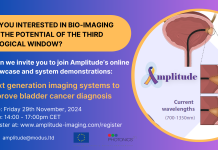Mark Smyth, National Lead for AI & GI Genius at Medtronic, examines how AI can transform colorectal cancer care and outlines a practical roadmap to ensure its adoption aligns with the NHS’s mission of delivering equitable, high-quality care
The NHS, founded on the principle of universal care, is at a critical juncture. Rising demand, limited resources, and the burden of colorectal cancer, diagnosed in over 42,000 people annually in the UK, are testing its capacity to innovate and adapt. Artificial intelligence (AI) has emerged as a transformative force in healthcare, promising enhanced diagnostics, streamlined care pathways, and better outcomes. In endoscopy, AI tools like GI Genius, developed by Medtronic, are driving innovation, equipping clinicians to detect polyps, standardise care, and combat colorectal cancer effectively. However, integrating AI into a complex, resource-limited system like the NHS is challenging, requiring vision, collaboration, and evidence-based approaches.
This article explores the transformative potential of AI in colorectal cancer care, informed by the COLODETECT trial (Rees et al., 2024). It also offers a practical roadmap to ensure AI adoption aligns with the NHS mission to provide equitable, high-quality care.
A system under pressure
Colorectal cancer is a leading cause of cancer-related deaths. Early detection is crucial, with five-year survival rates reaching 95% for early-stage cases but plummeting to just 6% for late-stage diagnoses (Cancer Research UK, 2024).
Colonoscopy is central to detecting pre-cancerous polyps, yet NHS endoscopy services are under significant strain due to rising demand, workforce shortages, and variability in clinical outcomes like adenoma detection rates (ADR) and post-colonoscopy colorectal cancer (PCCRC) rates. Such variability in care has serious consequences. Higher ADR correlates with reduced colorectal cancer risk and mortality (Corley et al, 2014). This disparity raises a critical question: How can the NHS deliver consistent, high-quality endoscopy services at scale?
AI offers a promising solution by augmenting human expertise, enhancing diagnostic accuracy, reducing variability, and supporting overburdened teams. However, its successful integration into NHS practice requires thoughtful planning and collaboration.
AI in endoscopy: A proven innovation
AI in endoscopy is no longer theoretical; it is a proven reality. GI Genius is one example of how AI can transform care. Evidence from the COLODETECT trial, involving over 2,000 patients across ten NHS endoscopy departments, demonstrates its efficacy (Rees et al., 2024). The trial showed that using GI Genius led to an 8% improvement compared to standard colonoscopy without AI, including better detection of challenging sessile serrated lesions (SSLs), which carry a higher risk of malignancy. Importantly, these gains were achieved without extending procedure times, critical for overstretched NHS services.
By improving ADR, GI Genius bridges performance gaps between clinicians, services, and Trusts, ensuring consistently high-quality care while reducing healthcare inequalities.
Its real-time detection and disease categorisation features also serve as invaluable training tools for less experienced endoscopists.
Beyond the data, the human impact of AI adoption is transformative. Better and earlier disease detection enables swift intervention, improving survival rates and saving lives. This under scores why AI deserves a central role in optimising colorectal cancer pathways while the evolving pace of AI development means clinicians will soon have an even wider array of tools at their disposal.
Barriers to AI adoption
Despite its promise, adopting AI in the NHS is challenging. Clinicians may fear over-reliance on technology or disruption to established workflows. Managers must weigh upfront costs against long-term benefits, while procurement teams face complexities in evaluating rapidly evolving AI technologies.
AI adoption also raises broader systemic concerns. Data governance is a longstanding issue in healthcare, and AI’s reliance on vast datasets amplifies these challenges. Ethical issues, particularly around the transparency of AI software algorithms and their underlying data, further complicate the landscape. Medtronic addresses these issues with GI Genius by using defined datasets (‘ground truths’) to train algorithms while ensuring patient data is not stored. However, such transparency and safeguards are not universal to all endoscopy AI solutions, complicating procurement decisions.
Effective AI adoption demands a multidisciplinary approach. NHS procurement must evolve to consider clinical efficacy, ongoing software improvements, and data security. National efforts, such as NICE’s appraisal of AI systems for endoscopy, are crucial for setting standards and guiding evidence-based procurement decisions.
Cultural and organisational challenges
No review of AI adoption barriers is complete without considering cultural resistance. The NHS has a strong tradition of evidence-based practice and demands robust proof of efficacy and safety, but this alone may have limited effect. While the COLODETECT trial provides compelling data, trust in AI also depends on experience and familiarity.
Building trust requires technical excellence, strong communication, and leadership. Leaders must address scepticism and foster a culture of innovation by showing how AI complements rather than replaces human expertise. Open dialogue is essential to convincing sceptics that AI is a tool to enhance practice, not a competitor.
Envisioning an AI-enabled NHS
An NHS that fully integrates AI could revolutionise colorectal cancer care. Early diagnoses would become routine, aided by tools like GI Genius that improve detection rates. Clinicians would benefit from reduced cognitive load, allowing them to focus on patient care, while data generated by AI would drive continuous improvements in technology and clinical outcomes. Standardising care across providers could reduce inequalities and ensure every patient receives the highest standard of care. This vision aligns with the government’s ambition for a digitally enabled NHS capable of detecting more cancers earlier and operating more efficiently.
Realising this vision requires decisive action. Clear policy frameworks, targeted funding, and incentives for innovation are essential. While the ‘Transforming NHS Care through Innovation’ report (Department of Health and Social Care, 2023) provides a foundation, further steps are needed to establish regulatory standards, ensure ethical oversight, and invest in workforce training.
A roadmap for AI implementation
For successful AI integration, the NHS should adopt a strategic approach comprising:
- Evidence-driven adoption: Build consensus with robust evidence tailored to real-world challenges.
- Evidence-driven adoption: Build consensus with robust evidence tailored to real-world challenges.
- Training and support: Equip clinicians with the knowledge and skills to maximise AI’s potential.
- Continuous evaluation: Monitor AI’s impact on outcomes, efficiency, and costs, refining practices as needed.
- Promoting innovation: Create positive narratives around AI to transform resistance into enthusiasm.
AI in endoscopy is more than a technological advancement; it represents a paradigm shift in colorectal cancer care. Tools like GI Genius, backed by robust evidence, demonstrate their potential to improve outcomes and enhance clinical performance. However, widespread adoption requires more than technological investment. Overcoming cultural, organisational, and systemic barriers demands collective action and strategic vision. With the right approach, the NHS can lead in leveraging AI to enhance care, save lives, and set a global standard for healthcare transformation.
References
Corley DA, Jensen CD, Marks AR, et al. Adenoma detection rate and colorectal cancer risk. N Engl J Med. 2014;370(14):1298-306.
Cancer Research UK (2024). Bowel cancer stats. https://cancerresearchuk.org [Accessed 18 Nov. 2024].
Dept. of Health & Social Care (2023). NHS innovation strategy. https://gov.uk [Accessed 18 Nov. 2024].
Rees, C.J., et al. (2024). AI and adenoma detection: Colo-Detect RCT. The Lancet, 403(2), 678–686.

This work is licensed under Creative Commons Attribution-NonCommercial-NoDerivatives 4.0 International.











